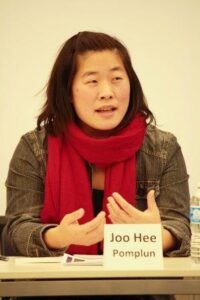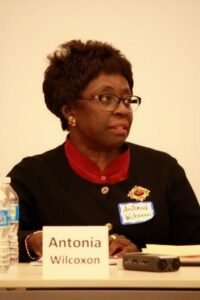The 2013-2014 Boards and Commissions Leadership Institute (BCLI) Issue Series came to a close with our final Issue Series on Thursday, March 6, 2014. Over 30 community members gathered at the Rondo Library in Saint Paul to discuss Health Equity in the Twin Cities with our panelists Antonia Wilcoxon, Director of Community Relations at the Minnesota Department of Human Services (DHS) and Joo Hee Pomplun, Organizer of the Health Equity Working Committee (HEWC).

We kicked off the event with the questions “What does ‘health’ mean to you?” and “What does ‘health equity’ mean to you?” After discussing in small groups, our panelists elaborated on their work in health equity and how it is connected to racial equity in their work and how their work is poised to capitalize on the assets of communities of color in the broader equity movement.
Ms. Wilcoxon shared that “We cannot make these decisions or arrive at some findings here in the absence of the very people that we are talking about because they are not here at the table to speak for themselves.”
Ms. Pomplun shared: “One thing that I’ve always really questioned is the State and however many agencies and institutions keep asking: ‘How do we solve these racial disparities; how do we solve these problems?’ But then they go back into their institutions and … think about it, and do their own little think-tank in their institutions. But the answer is in the community… There is so much readiness, so much passion, so much desire to be out there leading policy, making policy, making the changes that we want to see happen that will benefit our communities to create and advance the equity that is needed and necessary…”
The ensuing discussion centered around involvement of communities of color not only in advisory roles to local government – like the Cultural and Ethnic Communities Leadership Council that Ms. Wilcoxon facilitates – but also as the decision-makers and policy shapers, as Ms. Pomplun shared with her work helping draft a bill to amend a health related tax that would impact communities of color and LGBTQ communities.
The panelists closed by sharing some recommendations on how each of us can incorporate health equity into our own work, as well as ways to become an active member in local decision-making processes around health and health equity.
Check out the full audio recording of our panelists (41:56):
For more information about the BCLI, check out our website and join our listserv to get updates on upcoming events.
We look forward to seeing everyone this November for the beginning of our 2014-2015 BCLI Issue Series!
Antonia Wilcoxon
Director of Community Relations
Department of Human Services (DHS)
“That generated a process in which we created – I say we, but it was really the collective of both state employees which were in a smaller number than the cultural communities – a series of recommendations for the agency [DHS] to undertake… [including] that our agency did not hire the people who look like the people we served, so the agency changed its affirmative action goals to develop some goals for minority hire. Another concern was the fact that as an agency we knew very little about the community we serve, so they really recommended some anti-racism training which the senior leadership went through and they learned how much we excluded the community that we serve, and made some actions to make sure that we include more individuals affected by the disparities in the planning and development of the policies. The Cultural and Ethnic Communities Leadership Council was created and passed into law this past legislative session with the purpose of advising the commissioner of human services on disparities reduction.”
 Joo Hee Pomplun
Joo Hee Pomplun
Organizer
Health Equity Working Committee (HEWC)
“It’s so fantastic to have Antonia at DHS, because she is just such a champion and internal person to connect with to understand how the culture works, who to talk to, and just to help us navigate and message what we see as the barriers to the disparity reduction happening at DHS.
…
“[As part of a leadership institute I’m a part of for leaders of color and LGBTQ leaders in policy] we offered… a complimentary bill to this tax [a tax that largely affects communities of color and LGBTQ communities] and we wanted to bring some equity to that tax that would bring some of those resources back into our communities that would bring some benefits and reduce the impact of that tax… None of us ever did a bill before…but Senator Hayden was really fantastic and helped us walk through it and Senator Dibble as well…There is power. There is desire. There is passion. It’s just a matter of us taking those opportunities to do it.”
